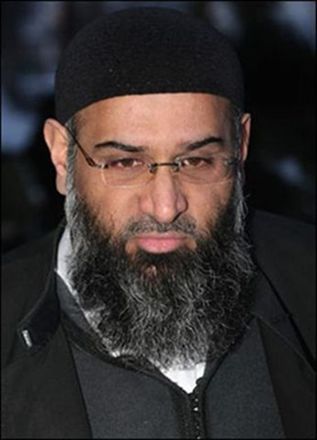
Muslims Against Crusades Banned in Latest Episode of the UK Jihad
Publication: Terrorism Monitor Volume: 9 Issue: 43
By:

In a move aimed at preempting planned protests to disrupt annual Remembrance Day celebrations on November 11, British Home Secretary Theresa May proscribed the British organization Muslims Against Crusades (MAC) on November 9. Declaring that MAC was “simply another name for an organization already proscribed,” she declared that membership or support for the organization would henceforth be “a criminal offense.” [1]
Led by individuals linked to formerly banned group al-Muhajiroun and its offshoots Islam4UK, al-Ghurabaa (“The Strangers”) and The Saved Sect, MAC emerged in the wake of a decision in January 2010 to proscribe al-Muhajiroun and Islam4UK (see Terrorism Monitor, January 21, 2010). Like its predecessors, MAC established a slick English-language website and started to organize vocal and often aggressive protests. Most infamously last year during the Remembrance Day celebrations, a group of 20 members of the group gathered in central London to chant during the commemorative minute’s silence and burn poppies worn by people in the UK during the Remembrance Day period. One member of the group, Emdadur Choudhury, who burned poppies and chanted “British soldiers burn in Hell!” during the two-minutes of silence observed on November 11, was convicted and fined £50 under the Public Order Act for causing “harassment, harm or distress” (BBC, March 7). The British-born Choudhury, who collects £792 per month in state benefits, vowed not to pay the fine, announcing: “I don’t have any respect for British soldiers, and if they lose a limb or two in Afghanistan then they deserve it. You expect me to feel sorry for them? Of course I don’t” (Daily Mail, March 8).
The announcement that MAC was going to hold a similar protest this year under the banner “Hell for Heroes” was made in late October when the group requested a police permit to hold the demonstration (Daily Mail, October 31). A press release published at the time announced that the intended protest was meant to “poignantly remember the victims of [British] military intervention.” [2] In response, anti-Islamist protest groups like the English Defence League (EDL) announced competing protest marches.
All this came in the wake of a demonstration by the group against Conservative Member of Parliament Mike Freer. Prior to the event’s announcement, the group published a flyer on its website in which it threatened Mr. Freer and referred to a previous incident in which East London student Roshonara Choudhry stabbed MP Steven Timms for his support of the Iraq War after claiming to have watched videos by the late American-Yemeni preacher Anwar al-Awlaki (see Terrorism Monitor, December 2, 2010). While there is no public evidence that Choudhry was linked to MAC or any of the other al-Muhajiroun successors, members linked to this network have shown up at protests during her court appearances and in a letter purportedly sent from Choudhry in prison, she acknowledges their support. [3] The campaign against Freer was launched after his role in obstructing the entrance into the UK of Palestinian activist Shaykh Raed Salah earlier this year was made public. Members of the MAC followed up their online threats by making an appearance at a constituency meeting Freer was holding at the North Finchley Mosque on October 28, disrupting events and, according to Freer, calling the openly gay MP a “Jewish homosexual pig” (Press Association, October 31).
The group was unfazed by the ban, with MAC leader Anjem Choudary declaring that it was a “bid by the government to cover up the truth” (Guardian, November 10). On his twitter feed he was even more confrontational, declaring, “a ban will never stop Islam and the Muslims. We will not rest until the flag of Islam flies high over Downing Street. This is a victory for us!” [4] A day or so after the ban, Choudary’s own home was raided as part of a police operation and he declared defiantly that “there is nothing like a ban and raid from the enemies of Islam and Muslims to increase the zeal with which one works to establish the Shari’ah!” [5]
The news of the ban came a week before it was revealed that a pair of Britons linked to the network of violent extremists that has emerged from al-Muhajiroun’s broader community were killed by drone strike in Pakistan. Though they appear to have been killed some three months ago, the news of the deaths of Ibrahim Adam and Mohammed Azmir Khan was only made public now due to confirmation by the men’s families in the UK (AFP, November 18). Both men were members of families that had produced a number of radicals, including Anthony Garcia (Adam’s brother, who is in a British jail for his role in an attempt to blow up a UK shopping mall in 2004 and who attended a training camp in Waziristan alongside some of the July 7, 2005 London bombers) and Mohammed Jabar Ahmed (Mohammed Azmir Khan’s brother, killed by a drone strike on September 8 last year after allegedly claiming at a public meeting of extremists in North Waziristan that he was going to lead a strike on the UK) (Daily Telegraph, November 18). Both pairs of brothers were known to have attended some al-Muhajiroun meetings in the UK and were identified by an American informant within al-Muhajiroun’s Lahore office.
It is unlikely this ban will be the last we hear of al-Muhajiroun’s successors. In the past the organization has simply reformed under a new name, established a new website and continued as before. However, the group’s capacity to attract the same sort of attention as in the past has diminished and it is roundly condemned by all parts of British Muslim society. Its meetings are poorly attended and its public protests attract limited numbers. It has in some ways been revitalized as a number of prominent members were released from prison – as radical as when they went in and are now respected in some eyes for having been “bloodied.” Yet it is unclear whether terrorist networks based abroad rely as much on the group’s networks as they did in the past. [6] Nevertheless, the group continues to retain a hard core and continues to attract some new young followers, keeping the radical narrative in the UK alive and showing that there remains an appetite for jihadist ideas amongst some elements of British youth.
Raffaello Pantucci is a Consulting Research Associate with the International Institute for Strategic Studies (IISS) and an EU Science and Technology Fellowship Programme (China) Research Fellow. He is a regular contributor on terrorism issues for newspapers, magazines and journals on both sides of the Atlantic, and is currently working on a book looking at the roots of the British Jihad.
Notes:
1. https://www.homeoffice.gov.uk/media-centre/news/mac-proscription.
2. The MAC website is now blocked, a copy of the statement can be found here: https://wwwbarkingspider.blogspot.com/2010/11/muslims-against-crusades-uaf-scum-plan.html
3. https://www.muslimprisoners.com/roshanarachoudhary-letter-1.html.
4. https://www.twitter.com/anjemchoudary, November 10, 2011.
5. https://www.twitter.com/anjemchoudary, November 12, 2011.
6. For a complete overview of the group’s links to terrorism, see Raffaello Pantucci, “The Tottenham Ayatollah and the Hook Handed Cleric: An examination of all their jihadi children,” Studies in Conflict and Terrorism 33(3), March 2010, pp. 226-245.





